现在完成时态与过去时态的区别
- 格式:doc
- 大小:132.50 KB
- 文档页数:13
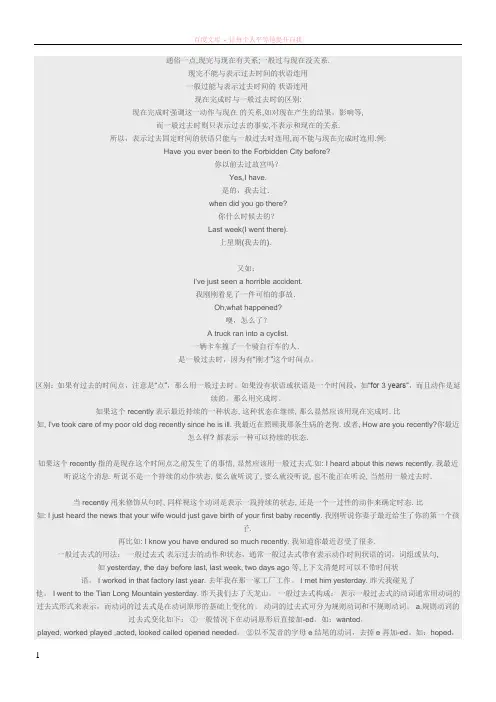
通俗一点,现完与现在有关系;一般过与现在没关系.现完不能与表示过去时间的状语连用一般过能与表示过去时间的状语连用现在完成时与一般过去时的区别:现在完成时强调这一动作与现在的关系,如对现在产生的结果,影响等,而一般过去时则只表示过去的事实,不表示和现在的关系.所以,表示过去固定时间的状语只能与一般过去时连用,而不能与现在完成时连用.例:Have you ever been to the Forbidden City before?你以前去过故宫吗?Yes,I have.是的,我去过.when did you go there?你什么时候去的?Last week(I went there).上星期(我去的).又如:I've just seen a horrible accident.我刚刚看见了一件可怕的事故.Oh,what happened?噢,怎么了?A truck ran into a cyclist.一辆卡车撞了一个骑自行车的人.是一般过去时,因为有“刚才”这个时间点。
区别:如果有过去的时间点,注意是“点”,那么用一般过去时。
如果没有状语或状语是一个时间段,如“for 3 years”,而且动作是延续的。
那么用完成时。
如果这个recently表示最近持续的一种状态, 这种状态在继续, 那么显然应该用现在完成时. 比如, I've took care of my poor old dog recently since he is ill. 我最近在照顾我那条生病的老狗. 或者, How are you recently?你最近怎么样? 都表示一种可以持续的状态.如果这个recently指的是现在这个时间点之前发生了的事情, 显然应该用一般过去式.如: I heard about this news recently. 我最近听说这个消息. 听说不是一个持续的动作状态, 要么就听说了, 要么就没听说, 也不能正在听说, 当然用一般过去时.当recently 用来修饰从句时, 同样视这个动词是表示一段持续的状态, 还是一个一过性的动作来确定时态. 比如: I just heard the news that your wife would just gave birth of your first baby recently. 我刚听说你妻子最近给生了你的第一个孩子.再比如: I know you have endured so much recently. 我知道你最近忍受了很多.一般过去式的用法:一般过去式表示过去的动作和状态,通常一般过去式带有表示动作时间状语的词,词组或从句,如 yesterday, the day before last, last week, two days ago 等,上下文清楚时可以不带时间状语。
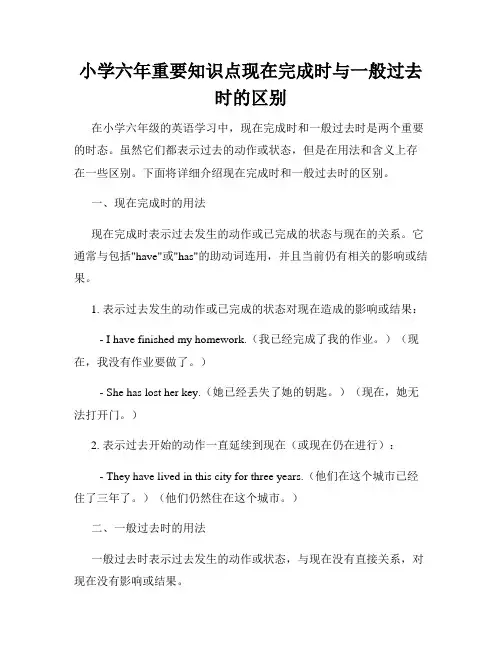
小学六年重要知识点现在完成时与一般过去时的区别在小学六年级的英语学习中,现在完成时和一般过去时是两个重要的时态。
虽然它们都表示过去的动作或状态,但是在用法和含义上存在一些区别。
下面将详细介绍现在完成时和一般过去时的区别。
一、现在完成时的用法现在完成时表示过去发生的动作或已完成的状态与现在的关系。
它通常与包括"have"或"has"的助动词连用,并且当前仍有相关的影响或结果。
1. 表示过去发生的动作或已完成的状态对现在造成的影响或结果:- I have finished my homework.(我已经完成了我的作业。
)(现在,我没有作业要做了。
)- She has lost her key.(她已经丢失了她的钥匙。
)(现在,她无法打开门。
)2. 表示过去开始的动作一直延续到现在(或现在仍在进行):- They have lived in this city for three years.(他们在这个城市已经住了三年了。
)(他们仍然住在这个城市。
)二、一般过去时的用法一般过去时表示过去发生的动作或状态,与现在没有直接关系,对现在没有影响或结果。
1. 表示过去发生的动作或状态:- I finished my homework yesterday.(我昨天完成了我的作业。
)- She lost her key last week.(她上周丢失了她的钥匙。
)2. 表示过去的习惯或经常性动作:- They always played soccer after school.(他们放学后总是踢足球。
)三、现在完成时与一般过去时的区别1. 时间表达上的差异:- 现在完成时通常使用含有"have"或"has"的助动词,并结合表示过去的时间状语,如"just", "already", "yet"等。
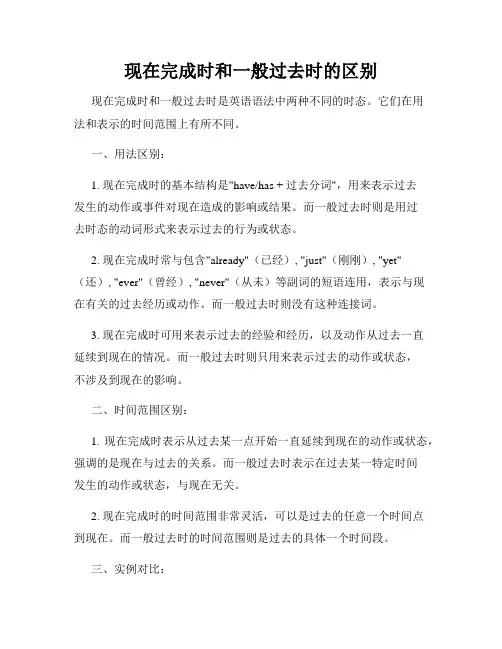
现在完成时和一般过去时的区别现在完成时和一般过去时是英语语法中两种不同的时态。
它们在用法和表示的时间范围上有所不同。
一、用法区别:1. 现在完成时的基本结构是"have/has + 过去分词",用来表示过去发生的动作或事件对现在造成的影响或结果。
而一般过去时则是用过去时态的动词形式来表示过去的行为或状态。
2. 现在完成时常与包含"already"(已经), "just"(刚刚), "yet"(还), "ever"(曾经), "never"(从未)等副词的短语连用,表示与现在有关的过去经历或动作。
而一般过去时则没有这种连接词。
3. 现在完成时可用来表示过去的经验和经历,以及动作从过去一直延续到现在的情况。
而一般过去时则只用来表示过去的动作或状态,不涉及到现在的影响。
二、时间范围区别:1. 现在完成时表示从过去某一点开始一直延续到现在的动作或状态,强调的是现在与过去的关系。
而一般过去时表示在过去某一特定时间发生的动作或状态,与现在无关。
2. 现在完成时的时间范围非常灵活,可以是过去的任意一个时间点到现在。
而一般过去时的时间范围则是过去的具体一个时间段。
三、实例对比:1. 现在完成时的例句:a) I have visited Paris three times.(我已经去过巴黎三次了。
)b) She has just finished her homework.(她刚刚完成了她的作业。
)c) Have you ever traveled to Japan?(你曾经去过日本吗?)上述例句表达的动作或经历与现在有关,时间范围是从过去到现在。
2. 一般过去时的例句:a) I visited Paris last year.(我去年去过巴黎。
)b) She finished her homework yesterday.(她昨天完成了她的作业。
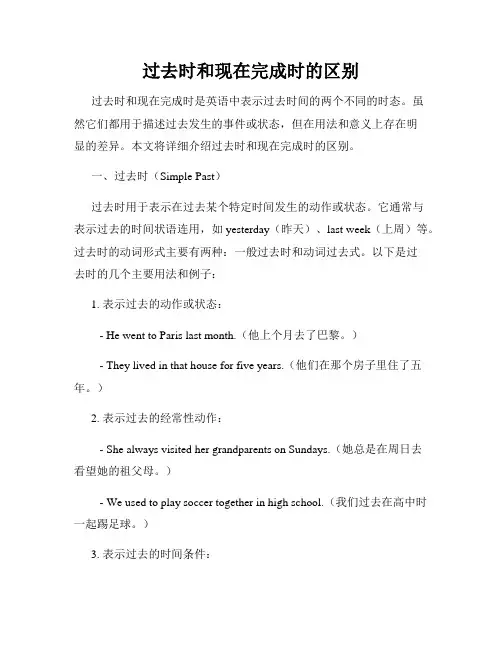
过去时和现在完成时的区别过去时和现在完成时是英语中表示过去时间的两个不同的时态。
虽然它们都用于描述过去发生的事件或状态,但在用法和意义上存在明显的差异。
本文将详细介绍过去时和现在完成时的区别。
一、过去时(Simple Past)过去时用于表示在过去某个特定时间发生的动作或状态。
它通常与表示过去的时间状语连用,如yesterday(昨天)、last week(上周)等。
过去时的动词形式主要有两种:一般过去时和动词过去式。
以下是过去时的几个主要用法和例子:1. 表示过去的动作或状态:- He went to Paris last month.(他上个月去了巴黎。
)- They lived in that house for five years.(他们在那个房子里住了五年。
)2. 表示过去的经常性动作:- She always visited her grandparents on Sundays.(她总是在周日去看望她的祖父母。
)- We used to play soccer together in high school.(我们过去在高中时一起踢足球。
)3. 表示过去的时间条件:- If it rained, we stayed at home.(如果下雨,我们就呆在家里。
) - I would help you if I had known about it earlier.(如果我早点知道,我会帮你的。
)二、现在完成时(Present Perfect)现在完成时用于表示过去发生的动作或状态对现在产生的影响或结果。
它强调过去发生的行为与现在的关联。
现在完成时的构成为"have/has + 过去分词"。
以下是现在完成时的几个主要用法和例子:1. 表示过去发生的动作对现在的影响:- She has written ten novels.(她已经写了十本小说。
)- They have known each other since childhood.(他们从小就互相认识。
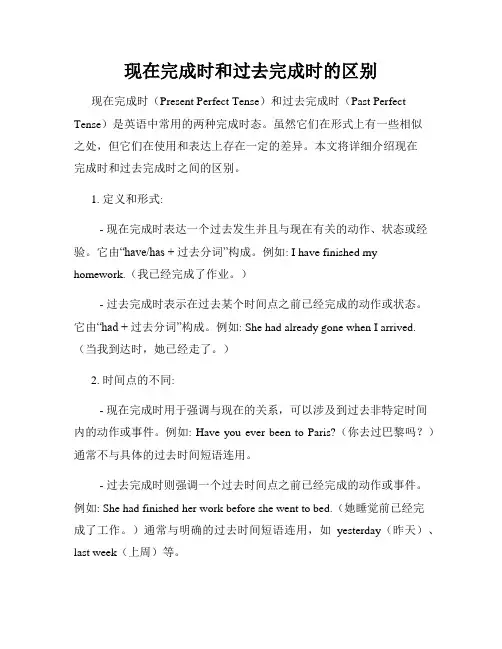
现在完成时和过去完成时的区别现在完成时(Present Perfect Tense)和过去完成时(Past Perfect Tense)是英语中常用的两种完成时态。
虽然它们在形式上有一些相似之处,但它们在使用和表达上存在一定的差异。
本文将详细介绍现在完成时和过去完成时之间的区别。
1. 定义和形式:- 现在完成时表达一个过去发生并且与现在有关的动作、状态或经验。
它由“have/has + 过去分词”构成。
例如: I have finished my homework.(我已经完成了作业。
)- 过去完成时表示在过去某个时间点之前已经完成的动作或状态。
它由“had + 过去分词”构成。
例如: She had already gone when I arrived.(当我到达时,她已经走了。
)2. 时间点的不同:- 现在完成时用于强调与现在的关系,可以涉及到过去非特定时间内的动作或事件。
例如: Have you ever been to Paris?(你去过巴黎吗?)通常不与具体的过去时间短语连用。
- 过去完成时则强调一个过去时间点之前已经完成的动作或事件。
例如: She had finished her work before she went to bed.(她睡觉前已经完成了工作。
)通常与明确的过去时间短语连用,如yesterday(昨天)、last week(上周)等。
3. 句子结构的不同:- 现在完成时经常使用与现在有关的时间状语,如already(已经)、yet(还)、just(刚刚)等。
例如: I have already eaten lunch.(我已经吃过午饭了。
)- 过去完成时则经常使用与过去有关的时间状语,如before(之前)、when(当...之时)等。
例如: He had finished his homework before he went out to play.(他出去玩之前已经完成了作业。
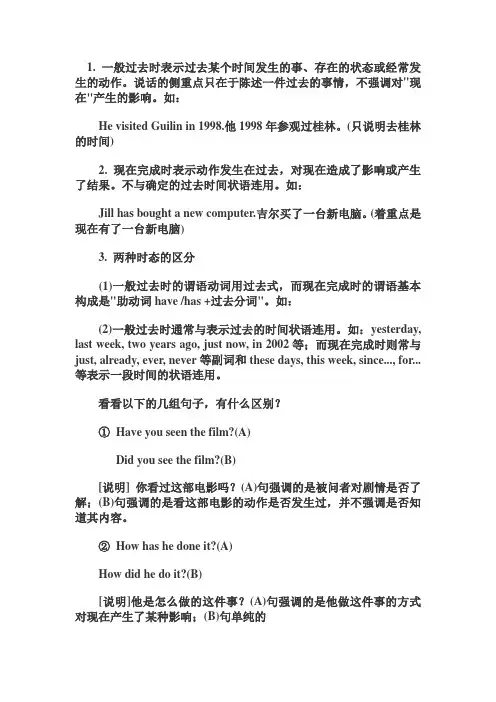
1. 一般过去时表示过去某个时间发生的事、存在的状态或经常发生的动作。
说话的侧重点只在于陈述一件过去的事情,不强调对"现在"产生的影响。
如:He visited Guilin in 1998.他1998年参观过桂林。
(只说明去桂林的时间)2. 现在完成时表示动作发生在过去,对现在造成了影响或产生了结果。
不与确定的过去时间状语连用。
如:Jill has bought a new computer.吉尔买了一台新电脑。
(着重点是现在有了一台新电脑)3. 两种时态的区分(1)一般过去时的谓语动词用过去式,而现在完成时的谓语基本构成是"助动词have /has +过去分词"。
如:(2)一般过去时通常与表示过去的时间状语连用。
如:yesterday, last week, two years ago, just now, in 2002等;而现在完成时则常与just, already, ever, never等副词和these days, this week, since..., for...等表示一段时间的状语连用。
看看以下的几组句子,有什么区别?①Have you seen the film?(A)Did you see the film?(B)[说明] 你看过这部电影吗?(A)句强调的是被问者对剧情是否了解;(B)句强调的是看这部电影的动作是否发生过,并不强调是否知道其内容。
②How has he done it?(A)How did he do it?(B)[说明]他是怎么做的这件事?(A)句强调的是他做这件事的方式对现在产生了某种影响;(B)句单纯的询问做这件事的方式。
③He has lived in Beijing for 8 years.(A)He lived in Beijing for 8 years.(B)[说明]他在北京住了8年。
(A)句讲的是到目前为止他在北京住了8年,可能还会继续在北京住下去。
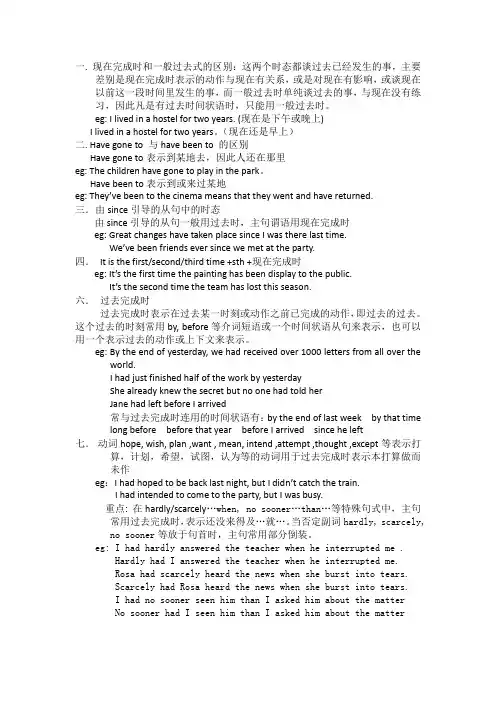
一. 现在完成时和一般过去式的区别:这两个时态都谈过去已经发生的事,主要差别是现在完成时表示的动作与现在有关系,或是对现在有影响,或谈现在以前这一段时间里发生的事,而一般过去时单纯谈过去的事,与现在没有练习,因此凡是有过去时间状语时,只能用一般过去时。
eg: I lived in a hostel for two years. (现在是下午或晚上)I lived in a hostel for two years。
(现在还是早上)二. Have gone to 与have been to 的区别Have gone to表示到某地去,因此人还在那里eg: The children have gone to play in the park。
Have been to表示到或来过某地eg: They’ve been to the cinema means that they went and have returned.三.由since引导的从句中的时态由since引导的从句一般用过去时,主句谓语用现在完成时eg: Great changes have taken place since I was there last time.We’ve been friends ever since we met at the party.四.It is the first/second/third time +sth +现在完成时eg: It’s the first time the painting has been display to the public.It’s the second time the team has lost this season.六.过去完成时过去完成时表示在过去某一时刻或动作之前已完成的动作,即过去的过去。
这个过去的时刻常用by, before等介词短语或一个时间状语从句来表示,也可以用一个表示过去的动作或上下文来表示。
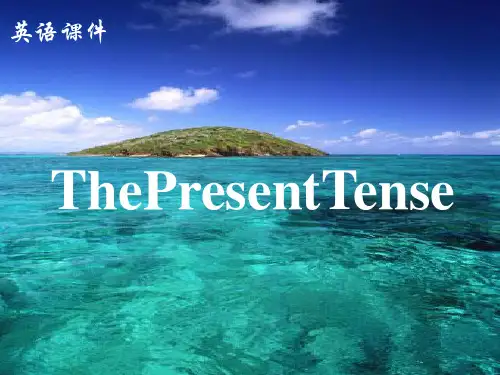
![[全]一般过去时态、现在完成时态、过去完成时态之间的区别](https://uimg.taocdn.com/862ac497e45c3b3566ec8b27.webp)
一般过去时态、现在完成时态、过去完成时态之间的本质区别本文将回答以下五个问题:1.一般过去时态和现在完成时态的本质区别是什么?2.一般过去时态和过去完成时态的本质区别是什么?3.现在完成时态和过去完成时态的本质区别是什么?4.现在完成时态能够和表示具体的过去时间连用吗?5.过去完成时态能够和表示具体的过去时间连用吗?一、一般过去时态一般过去时态的时间是“过去”,谓语形态——did do,时间助动词did是过去形。
一般过去时态是以现在时间为参考基准的过去,就是现在时间之前的动作状态,一般过去时态的时间区间(时间作用域)如下图所示:图1 一般过去时态时间作用域例句:I lost my key.我钥匙丢了。
图2 一般过去时态示例说明:钥匙过去时间丢的,现在也许已经找到了,对现在没影响。
一般过去时态本质上是“过去”的时态,所以可以接“确定”的过去时间。
二、现在完成时态现在完成时态的时间是“现在”,谓语形态——have done,时间助动词have 是现在形。
现在完成时态是以现在时间为参考基准的,就是到现在时间的动作状态,现在完成时态的时间区间(时间作用域)如下图所示:图3 现在完成时态时间作用域图3显示,虽然一个动作可能是在过去发生的,但是其时空作用域(时效性)对现在产生影响。
例句:I have lost my key.我钥匙丢了。
图4 现在完成时态示例说明:钥匙过去时间丢的,但是现在依旧没找到,对现在有影响。
现在完成时态本质上是“现在”的时态,所以不能接“确定”的过去时间。
三、过去完成时态过去完成时态的时间是“过去”,谓语形态——had done, 时间助动词had是过去形。
过去完成时态是以过去时间为参考基准的,就是到过去时间的动作状态,过去完成时态的时间区间(时间作用域)如下图所示:图5 过去完成时态时间作用域图5显示,虽然一个动作可能是在过去的过去发生的,但是其时空作用域(时效性)对过去产生影响。
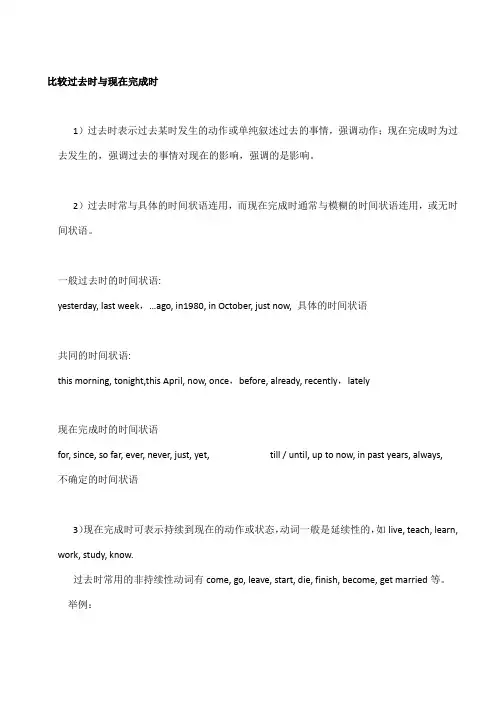
比较过去时与现在完成时1)过去时表示过去某时发生的动作或单纯叙述过去的事情,强调动作;现在完成时为过去发生的,强调过去的事情对现在的影响,强调的是影响。
2)过去时常与具体的时间状语连用,而现在完成时通常与模糊的时间状语连用,或无时间状语。
一般过去时的时间状语:yesterday, last week,…ago, in1980, in October, just now, 具体的时间状语共同的时间状语:this morning, tonight,this April, now, once,before, already, recently,lately现在完成时的时间状语for, since, so far, ever, never, just, yet,till / until, up to now, in past years, always, 不确定的时间状语3)现在完成时可表示持续到现在的动作或状态,动词一般是延续性的,如live, teach, learn, work, study, know.过去时常用的非持续性动词有come, go, leave, start, die, finish, become, get married等。
举例:I saw this film yesterday.(强调看的动作发生过了。
)I have seen this film.(强调对现在的影响,电影的内容已经知道了。
)Why did you get up so early?(强调起床的动作已发生过了。
)Who hasn't handed in his paper(强调有卷子,可能为不公平竞争。
)She has returned from Paris.她已从巴黎回来了。
She returned yesterday.她是昨天回来了。
He has been in the League for three years.(在团内的状态可延续)He has been a League member for three years.(是团员的状态可持续)He joined the League three years ago.( 三年前入团,joined为短暂行为。
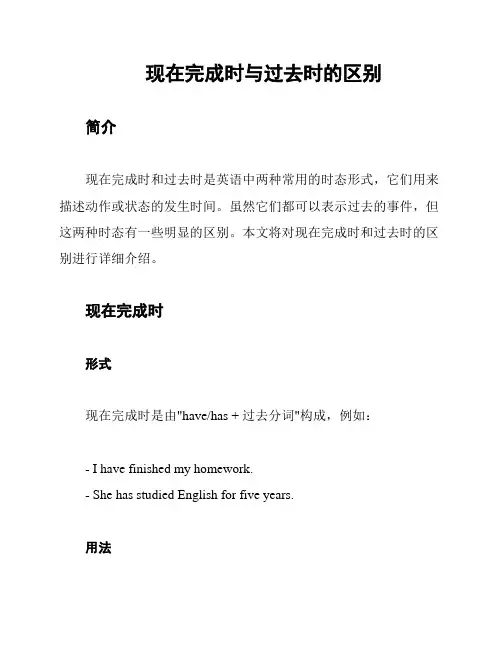
现在完成时与过去时的区别简介现在完成时和过去时是英语中两种常用的时态形式,它们用来描述动作或状态的发生时间。
虽然它们都可以表示过去的事件,但这两种时态有一些明显的区别。
本文将对现在完成时和过去时的区别进行详细介绍。
现在完成时形式现在完成时是由"have/has + 过去分词"构成,例如:- I have finished my homework.- She has studied English for five years.用法现在完成时常用来表达以下几种情况:1. 过去某个时间点开始的动作一直延续到现在,如"I have lived in this city for ten years."(我已经在这个城市住了十年了)。
2. 表示过去某个时间内发生的动作对现在产生的影响,如"I have lost my key."(我把钥匙弄丢了)。
3. 用来表示过去发生的动作对现在产生的结果或者是现在状态,如"I have finished my homework."(我已经完成作业了)。
过去时形式过去时是表示过去发生的动作或状态的时态形式,根据动词的不同变化形式也不同,例如:- I studied English last night.- She went to the park yesterday.用法过去时常用来描述以下几种情况:1. 描述过去的事件或动作,如"I studied English last night."(我昨晚研究了英语)。
2. 描述过去经常或惯性发生的动作,如"I used to visit my grandparents every weekend."(我过去每个周末都去看望我的祖父母)。
3. 表示过去某个时间点的状态或动作,如"She felt tired yesterday."(昨天她感到疲倦)。
关键区别是时间不同,一个是现在完成,一个是过去完成。
现在完成指现在,就是现在时间已经完成,所以一定是现在,过去完成才是过去。
现在完成时如:I have had breakfast, 过去完成时如:I had had breakfast.二者的区别从时态的作用时间上,我们就已经可以区分这两个时态了,即:动作或状态发生在过去的,其作用仅影响过去的,用一般过去时态;动作或状态发生在过去的,其作用影响到现在的;用现在完成时态;现在完成时态的动作或状态虽然是过去发生的,虽然过去了,但是其作用影响了现在,所以现在完成时态用have/has(现在时间)作为其时间助动词,生拉硬拽的把这个过去的动作状态的效果拉伸至现在。
现在完成时态和现在很亲密,现在你应该明白了为什么新闻中播报某人离世一般都用现在完成时态了吧!Jack has died from cancer, aged 79.杰克因癌症去世了,享年79岁。
「一般过去时」和「现在完成时」描述的都是过去发生的某动作,区别在于说话者主观上是否强调这个动作对现在的影响。
所以一般情况下就用「一般过去时」,要想强调这种影响才用「现在完成时」。
同理,「过去完成时」则是发生在过去的过去的动作,强调对过去有影响。
两个误区误区1:一般过去时发生在比较远的过去,现在完成时发生在比较近的过去其实一般过去时和现在完成时都是描述发生在过去的动作,至于这个过去距离现在到底有多远多近,则是不确定的。
即使是在同一个句子中同时使用了这两种时态,也不能说现在完成时就一定比一般过去时更近,一个反例足矣:The universe has cooled downsince the Big Bang 13.7 billion years ago, but life appeared on Earth rather recently, some 3.8 billion years ago. 宇宙尺度,大爆炸在前,生命出现在后。
现在完成时与过去完成时的区别是什么?现在完成时和过去完成时都是英语中的时态,用于描述过去发生的动作或事件。
它们之间有一些区别,下面是它们的区别:现在完成时 (Present Perfect)1. 表示过去发生的动作或事件对当前情况的影响。
2. 构成方式:助动词 "have" + 过去分词。
3. 例句:- 我们已经看过这部电影了。
(We have watched this movie.)- 他们已经吃过晚饭了。
(They have had dinner.)4. 可以与一些时间状语连用,如 "just"、"already"、"yet" 等。
5. 可以用于描述经验、惯和重复动作。
6. 强调对现在的影响和连续性。
7. 它可以与现在相关的时间段连用,如 "today"、"this week"、"this year" 等。
8. 用于讨论与现在事件相关的动作或事件。
9. 双重含义:1)强调动作完成的结果或状态;2)强调动作发生的时间。
过去完成时 (Past Perfect)1. 表示过去某个时间点之前已经发生的动作或事件。
2. 构成方式:助动词 "had" + 过去分词。
3. 例句:- 我们已经看过这部电影了,所以我们决定去看其他的。
(We had watched this movie, so we decided to see something else.) - 他们已经离开了,当我到达那里。
(They had left when I arrived there.)4. 可以与一些时间状语连用,如 "before"、"after"、"by the time" 等。
5. 可以用于描述发生在过去的动作或事件。
通俗一点,现完与现在有关系;一般过与现在没关系.现完不能与表示过去时间的状语连用一般过能与表示过去时间的状语连用现在完成时与一般过去时的区别:现在完成时强调这一动作与现在的关系,如对现在产生的结果,影响等,而一般过去时则只表示过去的事实,不表示和现在的关系.所以,表示过去固定时间的状语只能与一般过去时连用,而不能与现在完成时连用.例:Have you ever been to the Forbidden City before?你以前去过故宫吗?Yes,I have.是的,我去过.when did you go there?你什么时候去的?Last week(I went there).上星期(我去的).又如:I've just seen a horrible accident.我刚刚看见了一件可怕的事故.Oh,what happened?噢,怎么了?A truck ran into a cyclist.一辆卡车撞了一个骑自行车的人.是一般过去时,因为有“刚才”这个时间点。
区别:如果有过去的时间点,注意是“点”,那么用一般过去时。
如果没有状语或状语是一个时间段,如“for 3 years”,而且动作是延续的。
那么用完成时。
如果这个recently表示最近持续的一种状态, 这种状态在继续, 那么显然应该用现在完成时. 比如, I've took care of my poor old dog recently since he is ill. 我最近在照顾我那条生病的老狗. 或者, How are you recently?你最近怎么样? 都表示一种可以持续的状态.如果这个recently指的是现在这个时间点之前发生了的事情, 显然应该用一般过去式.如: I heard about this news recently. 我最近听说这个消息. 听说不是一个持续的动作状态, 要么就听说了, 要么就没听说, 也不能正在听说, 当然用一般过去时.当recently 用来修饰从句时, 同样视这个动词是表示一段持续的状态, 还是一个一过性的动作来确定时态. 比如: I just heard the news that your wife would just gave birth of your first baby recently. 我刚听说你妻子最近给生了你的第一个孩子.再比如: I know you have endured so much recently. 我知道你最近忍受了很多.一般过去式的用法:一般过去式表示过去的动作和状态,通常一般过去式带有表示动作时间状语的词,词组或从句,如 yesterday, the day before last, last week, two days ago 等,上下文清楚时可以不带时间状语。
区分一般过去时和现在完成时一.相同点:1. 这两中时态中的动作都发生在过去2. 倘若这个动词的过去时是加ed构成,那么这个动词的过去分词和过去时相同例如:I cleaned(过去时) the room yesterday.I have already cleaned(过去分词)the room.二.不同点1. 一般过去时表示过去某个时间发生的事、存在的状态或经常发生的动作,说话的侧重点在于陈述一件过去的事情,与现在没有关系。
如果你只是要陈述你做了什么,陈述的东西和目前状况没有太大影响,就用一般过去时;现在完成时表示与现在有关系的发生在过去的动作,到现在为止这个动作可能结束也可能继续下去。
它不与表示过去的时间状语连用. 例如:(1.) I washed the plate. “我洗盘子了”(那么洗盘子这个话题基本到此打住,基本没有下文)(1.) I have washed the plate. “我已经洗好盘子了。
”(强调做过,完成了。
还有可能意思是,既然我已经洗好盘子了,我就该干什么什么了,或者你就应该履行什么承诺之类的。
)(2.)I saw the film yesterday. 强调看电影的时间是昨天。
(2.) I have seen the flim.我已经看过这部电影了(我现在知道电影的内容/ 我不想在看这电影了,我们选其他的吧。
)(3.) I taught here for eight years我在这教过八年书(只陈述过去的事实,现在可能不在这教书了)(3.) I have taught here for eight years 我在这教书八年了(现在还在教,还可能继续教下去)(4.) I leanrt English for six years 我学过六年英语(以前学过,现在可能不学了)(4.) I have learnt English for six years我学英语已经学了六年了(现在还在学,可能还要学下去)2. 常连用的时间状语不同(1)常与一般过去时连用的时间状语yesterday (morning, afternoon, evening):昨天(早上,下午,晚上)the day before yesterday前天last+时间名词:上一个…如:last night (week,Sunday,weekend,month,winter,year,century 世纪)时间段+ ago:在…之前如:three days ago:三天前 a moment ago刚才this morning/afternoon今天早上/ 今天下午when+ 过去时的句子:当…的时候when I got upjust now 刚刚before 以前或before+时间点at the age of 10 (过去年龄段):在10岁的时候in the old days 在古时候at that time/ moment在那时候(2)常与现在完成时连用的时间状语for + 时间段: 持续了一段时间I have lived here for 8 years.He has done his homework for two hours.since + 过去时间点/ 过去时句子:自从…开始since + 时间段+ ago:自从…开始I have lived here since 2008He has done his homework since 8:00 p.m. / He has done his homework since two hours ago.just:刚刚I have just called youever: 曾今、从来Have you even been to Beijing?Has he ever made such a mistake?never: 从未从来没有I have never been there before.already已经I have already finished my homework.yet: 还(否定句)已经(疑问句)I haven’t finished my homework yet.Have you finshed your homework yet?before: 以前Have you eaten seafood before?I haven’t seen him before.so far 到目前为止I have finished 50% of the work.In the past + 时间段用just ever never already yet before填空他刚从学校回来He has __ come back from school你以前去过广州吗?Have you been to Guangzhou __?我以前从没去过广州。
现在完成时态与过去时态的区别现在完成时态与过去时态的区别1. 意义上的区别一般过去时态只是单纯地表示过去某一时间发生过的动作或者存在的状态, 和现在没有任何联系, 只着眼于过去.现在完成时态重点强调与现在的联系, 表示过去发生的动作对现在造成的影响和结果, 属于现在时的范畴.试比较下列例句:I have washed my shoes . 我刷过鞋了.强调的是过去的某一时间发生的动作"洗" 对现在产生的影响是" 鞋是干净的" .I washed my shoes yesterday . 我昨天刷了鞋.强调昨天做过"洗" 这个动作, 与现在鞋是否干净没有关系.My father has bought a new car . 我爸爸买了一辆新车.强调在过去的某一时间发生的动作"买" , 对现在造成的结果是" 他有了一辆新车".My father bought a new car last Sunday . 我爸爸上个周日买了一辆新车.强调上个周日"买" 这个动作发生过, 与爸爸现在是否有车无关. 也许这辆车是给别人的.2. 时间状语的区别一般过去时态只能与表示过去的时间状语连用, 如 yesterday, last week, three years ago, in 1990 , just now 等.现在完成时态中的时间状语表达的时间是到现在为止. 如: just 刚刚, before 以前, "since / ever since +过去时间 " 自从...... 开始, ever 曾经, never 从未, 未曾, "already" 已经 , " for+ 时间段"已有多长时间了. in the last/ past ten years 在过去的十年里, so far 到目前为止. up to now 直到现在, this week 这个星期等等.二者的根本区别在于过去时强调事实,常有具体的时间状语标志,如,yesterday/5.oclock/this morning,just now,ago etc---,examples:1.I met her a week ago.2.We have a English class this morning.而完成时有两种用法或意义1,影响性:也是一个过去动作但却强调它对现在的影响,没具体时间点作时间状语,但常有,already,yet,before,just作状语。
(1).Have you had your breakfast,yet?(2).I have seen this movie before.(3).He has just finished his homework.2.持续性:表动作从过去的一个点开始,一直持续到现在。
(现在完成时)如果只需到过去的另一个点就是过去完成时。
动词要用延续性的,还常有 for(引导线状时间状语),since(引导点状时间状语)(1).I have been worked here for 20 years./I have worked here since 20 years ago.(2).I have been a member of the League for 2 years.这里的be a member of 代替不可延续的动词短语join the League。
(3).I had been a teacher before I moved here 2 years ago.(过去完成时,表达过去之过相同点:都是发生在过去。
不同点:过去时只注重此事已发生了;现在完成时强调这件事对现在的影响。
比如说:我吃过早饭了。
如果你用过去时:I had my breakfast.只是表明吃过早饭了,至于现在饿不饿,还想不想吃点别的,情况不明。
但如果你用现在完成时:I have had my breakfast.则表明,我已吃过早饭了,言外之意是:我现在不饿,我现在不想吃别的了。
I已完成用法表示一个过去发生并结束的动作对现在产生的结果和影响。
这一类情况可以细致分为下述两种情况。
1).表示开始于过去的动作刚刚结束。
常和just,now,already,yet,not…yet等连用。
Li Ming has just turned off the light.李明刚刚把灯关上。
(说明现在灯关上了)I've finished my homework now.现在我已经做完作业了。
(说明可以交作业或做别的了)2). 表示过去动作的结果,现在仍残留着。
一般不用时间状语。
I have lost my pen.我把笔丢了。
(说明过去某时丢的,现在我还没找到这支笔)She has become a teacher.她已经当了老师。
(说明她现在仍是老师)She has become a teacher.她已经当了老师。
(说明她现在仍是老师)II未完成用法。
表示过去已经开始,持续到现在,而且还能继续下去的动作或状态。
往往和表示一段时间的状语连用。
如today,this week(month),lately,recently,these days,in the past few days,during the last two weeks. since,since yesterday,since 2 days ago,since 1991,for a longtime,for a month,so far,up to now,till(until) now等。
He has lived here for 30 years.他住在这儿三十年了。
(现在还住在这儿)They've known each other since childhood.他们从小彼此相识。
(现在还继续往来)How long have you studied English?你学英语多久了?(现在仍在学)III经验性用法。
表示从过去到现在之间曾经经历过的事情。
一般译为汉语“过”,常和often,never,ever,once,twice,three times,before,since 等连用。
I have been to the Summer Palace twice.我曾经去过颐和园两次。
We have visited your school before.我以前曾去过你们学校。
(过去的经历,但现在依然记得)二,现在完成时的时间状语I现在完成时属于现在时范围,故不能和过去的时间状语连用。
如:yesterday,last Sunday,in1990,three years ago等。
但是,在强调动作产生的后果和影响时,可以和一些表示不确定的时间状语连用。
a. 用副词already和yet。
already一般用于肯定句中,yet一般用于否定句和疑问句中。
如:We have already finished our homework.我们已完成作业了。
They haven't finished their homework yet.他们还没有完成作业。
b.用ever 和never。
多用于否定或疑问句中,表示“曾经”或“从未“等。
如:-Have you ever been to the Great Wall?你曾经去过长城吗-I have never been to the Great Wall.我从未去过长城。
c.用表示到说话为止的过去时间状语,如just,before,up to now,the past few years等。
例如:I have seen her before,but I can not remember where.我以前见过她,但记不起在哪里见过。
He has been there three times the last few days.近几年他去过那里三次了。
d.用包括“现在”在内的时间状语,如:now,today,thismorning(month,year,term)等。
例如:-Have you met him today?-No,Ihaven't.今天你见过他吗?我没有。
How many times have you been there this year?今年你去过那里多少次?II短暂性动词不能和表一段时间的时间状语连用。
如:come, go, arrive, reach, see,hear, close, leave, begin, start, lose, buy, close, fall, join, die, get up等。
但如果要保留表一段时间的时间状语,必须将动词改为延续性动词。
现归纳总结一下由非延续性动词到延续性动词的转换,如:fall asleep (ill) →be asleep(ill) get to know→ knowbegin,(start)→ be on open →be openbuy→ have get up→ be updie→ be dead go out→ be outcome→ be in close→be closedarrive→be here join→be in, be a +名词finish( end )→be over leave, move →be away, be out ofborrow →keep go to school→be a studentcatch(a cold)→ have(a cold) begin to study→studycome back→be back put on→wear 或be on如:He has been a soldier for three years.他参军三年了。
His father has been dead for two years.他父亲去世二年了。
The film has been on for ten minutes.电影已开始十分钟了。
We have studied English for three years. 我们(开始)学英语已三年了。
三,,现在完成时和一般过去时的区别现在完成时和一般过去时都表示在过去完成的动作。
但现在完成时强调的是这一动作与现在的关系。
如对现在产生的结果或影响等,而一般过去时只表示动作在过去某一时刻发生,不表示和现在的关系。
试比较: I have lost my new book. 我把新书丢了。